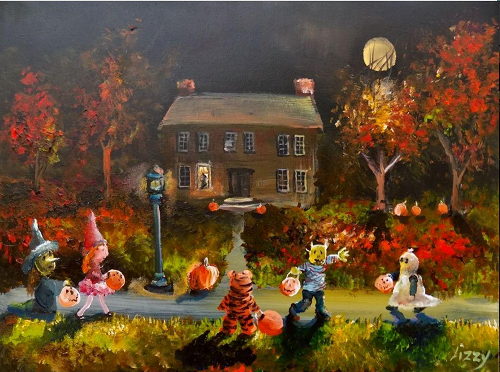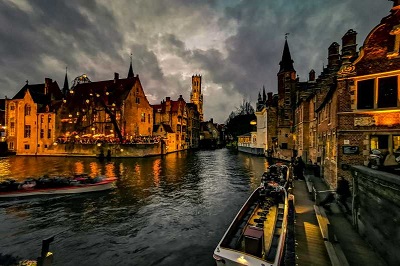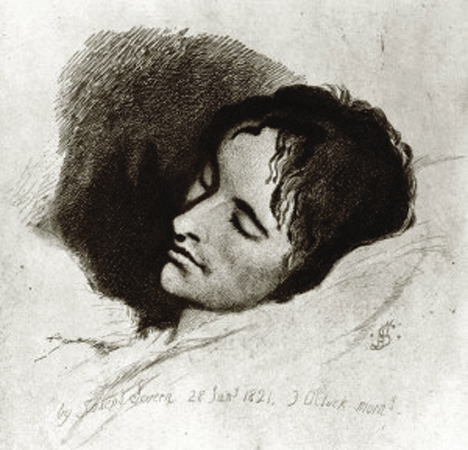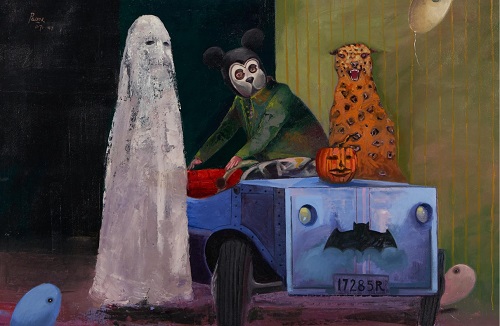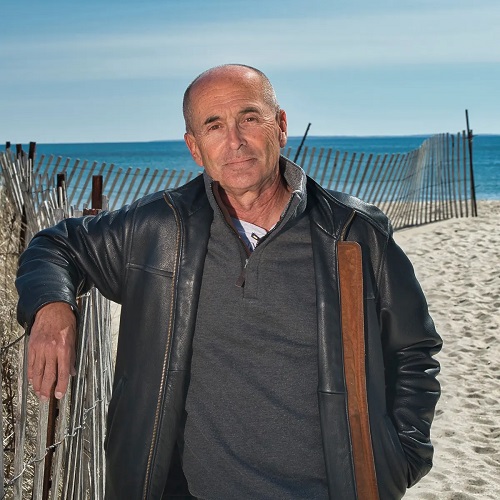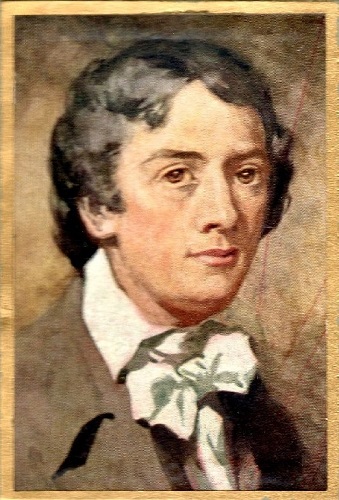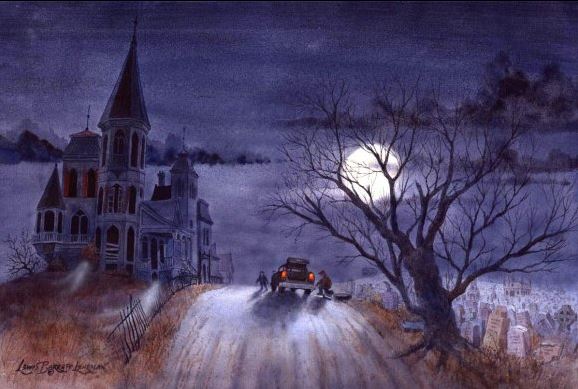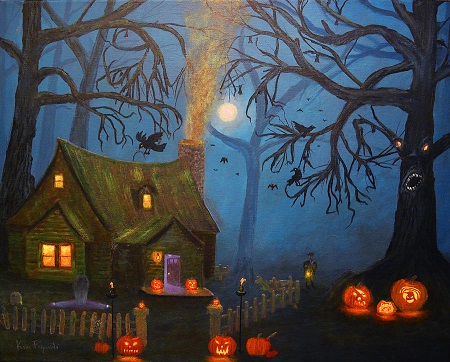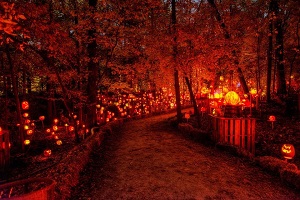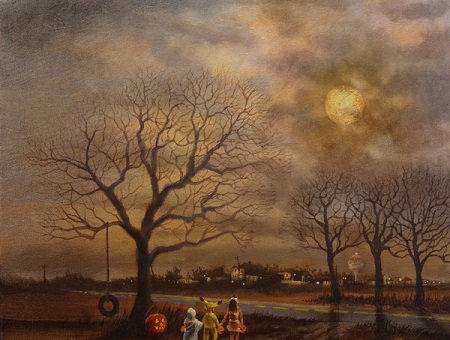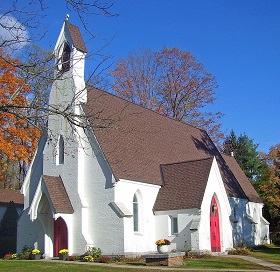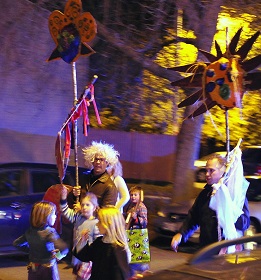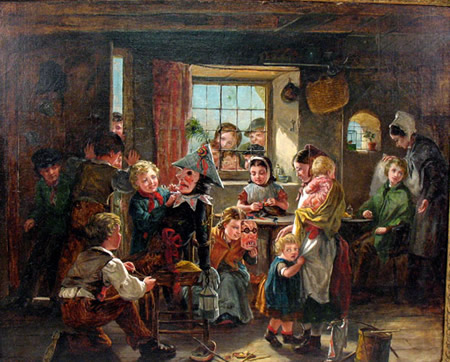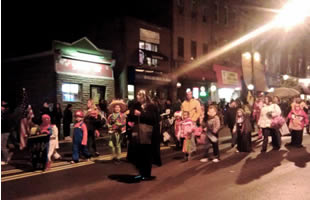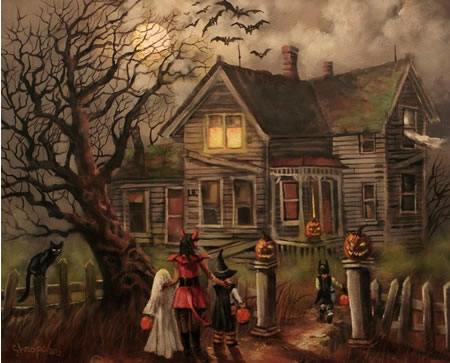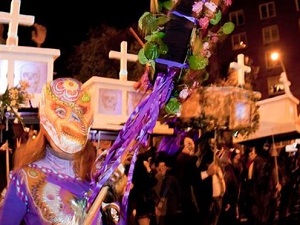Bij Halloween
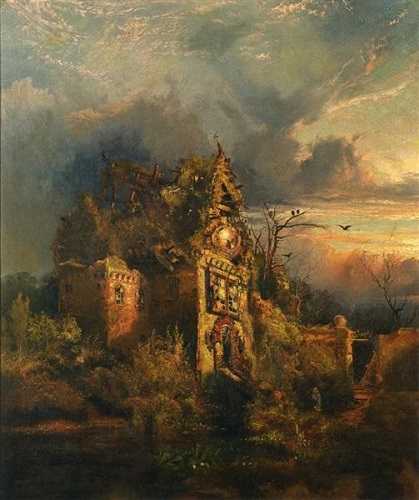
The Haunted House
Suggested by a drawing of Thomas Moran, the American painter.
This must be the very night!
The moon knows it!—and the trees!
They stand straight upright,
Each a sentinel drawn up,
As if they dared not know
Which way the wind might blow!
The very pool, with dead gray eye,
Dully expectant, feels it nigh,
And begins to curdle and freeze!
And the dark night,
With its fringe of light,
Holds the secret in its cup!
II. What can it be, to make
The poplars cease to shiver and shake,
And up in the dismal air
Stand straight and stiff as the human hair
When the human soul is dizzy with dread—
All but those two that strain
Aside in a frenzy of speechless pain,
Though never a wind sends out a breath
To tunnel the foggy rheum of death?
What can it be has power to scare
The full-grown moon to the idiot stare
Of a blasted eye in the midnight air?
Something has gone wrong;
A scream will come tearing out ere long!
III. Still as death,
Although I listen with bated breath!
Yet something is coming, I know—is coming!
With an inward soundless humming
Somewhere in me, or if in the air
I cannot tell, but it is there!
Marching on to an unheard drumming
Something is coming—coming—
Growing and coming!
And the moon is aware,
Aghast in the air
At the thing that is only coming
With an inward soundless humming
And an unheard spectral drumming!
IV. Nothing to see and nothing to hear!
Only across the inner sky
The wing of a shadowy thought flits by,
Vague and featureless, faceless, drear—
Only a thinness to catch the eye:
Is it a dim foreboding unborn,
Or a buried memory, wasted and worn
As the fading frost of a wintry sigh?
Anon I shall have it!—anon!—it draws nigh!
A night when—a something it was took place
That drove the blood from that scared moon-face!
Hark! was that the cry of a goat,
Or the gurgle of water in a throat?
Hush! there is nothing to see or hear,
Only a silent something is near;
No knock, no footsteps three or four,
Only a presence outside the door!
See! the moon is remembering!—what?
The wail of a mother-left, lie-alone brat?
Or a raven sharpening its beak to peck?
Or a cold blue knife and a warm white neck?
Or only a heart that burst and ceased
For a man that went away released?
I know not—know not, but something is coming
Somehow back with an inward humming!
V. Ha! look there! look at that house,
Forsaken of all things, beetle and mouse!
Mark how it looks! It must have a soul!
It looks, it looks, though it cannot stir!
See the ribs of it, how they stare!
Its blind eyes yet have a seeing air!
It knows it has a soul!
Haggard it hangs o’er the slimy pool,
And gapes wide open as corpses gape:
It is the very murderer!
The ghost has modelled himself to the shape
Of this drear house all sodden with woe
Where the deed was done, long, long ago,
And filled with himself his new body full—
To haunt for ever his ghastly crime,
And see it come and go—
Brooding around it like motionless time,
With a mouth that gapes, and eyes that yawn
Blear and blintering and full of the moon,
Like one aghast at a hellish dawn!—
The deed! the deed! it is coming soon!
VI. For, ever and always, when round the tune
Grinds on the barrel of organ-Time,
The deed is done. And it comes anon:
True to the roll of the clock-faced moon,
True to the ring of the spheric chime,
True to the cosmic rhythm and rime,
Every point, as it first fell out,
Will come and go in the fearsome bout.
See! palsied with horror from garret to core,
The house cannot shut its gaping door;
Its burst eye stares as if trying to see,
And it leans as if settling heavily,
Settling heavy with sickness dull:
It also is hearing the soundless humming
Of the wheel that is turning—the thing that is coming!
On the naked rafters of its brain,
Gaunt and wintred, see the train
Of gossiping, scandal-mongering crows
That watch, all silent, with necks a-strain,
Wickedly knowing, with heads awry
And the sharpened gleam of a cunning eye—
Watch, through the cracks of the ruined skull,
How the evil business goes!—
Beyond the eyes of the cherubim,
Beyond the ears of the seraphim,
Outside, forsaken, in the dim
Phantom-haunted chaos grim
He stands, with the deed going on in him!
VII. O winds, winds, that lurk and peep
Under the edge of the moony fringe!
O winds, winds, up and sweep,
Up and blow and billow the air,
Billow the air with blow and swinge,
Rend me this ghastly house of groans!
Rend and scatter the skeleton’s bones
Over the deserts and mountains bare!
Blast and hurl and shiver aside
Nailed sticks and mortared stones!
Clear the phantom, with torrent and tide,
Out of the moon and out of my brain,
That the light may fall shadowless in again!
VIII. But, alas, then the ghost
O’er mountain and coast
Would go roaming, roaming! and never was swine
That, grubbing and talking with snork and whine
On Gadarene mountains, had taken him in
But would rush to the lake to unhouse the sin!
For any charnel
This ghost is too carnal;
There is no volcano, burnt out and cold,
Whose very ashes are gray and old,
But would cast him forth in reviving flame
To blister the sky with a smudge of shame!
IX. Is there no help? none anywhere
Under the earth or above the air?—
Come, sad woman, whose tender throat
Has a red-lipped mouth that can sing no note!
Child, whose midwife, the third grim Fate,
Shears in hand, thy coming did wait!
Father, with blood-bedabbled hair!
Mother, all withered with love’s despair!
Come, broken heart, whatever thou be,
Hasten to help this misery!
Thou wast only murdered, or left forlorn:
He is a horror, a hate, a scorn!
Come, if out of the holiest blue
That the sapphire throne shines through;
For pity come, though thy fair feet stand
Next to the elder-band;
Fling thy harp on the hyaline,
Hurry thee down the spheres divine;
Come, and drive those ravens away;
Cover his eyes from the pitiless moon,
Shadow his brain from her stinging spray;
Droop around him, a tent of love,
An odour of grace, a fanning dove;
Walk through the house with the healing tune
Of gentle footsteps; banish the shape
Remorse calls up thyself to ape;
Comfort him, dear, with pardon sweet;
Cool his heart from its burning heat
With the water of life that laves the feet
Of the throne of God, and the holy street!
X. O God, he is but a living blot,
Yet he lives by thee—for if thou wast not,
They would vanish together, self-forgot,
He and his crime:—one breathing blown
From thy spirit on his would all atone,
Scatter the horror, and bring relief
In an amber dawn of holy grief!
God, give him sorrow; arise from within,
His primal being, deeper than sin!
XI. Why do I tremble, a creature at bay?
‘Tis but a dream—I drive it away.
Back comes my breath, and my heart again
Pumps the red blood to my fainting brain
Released from the nightmare’s nine-fold train:
God is in heaven—yes, everywhere,
And Love, the all-shining, will kill Despair!—
To the wall’s blank eyeless space
I turn the picture’s face.
XII. But why is the moon so bare, up there?
And why is she so white?
And why does the moon so stare, up there—
Strangely stare, out of the night?
Why stand up the poplars
That still way?
And why do those two of them
Start astray?
And out of the black why hangs the gray?
Why does it hang down so, I say,
Over that house, like a fringed pall
Where the dead goes by in a funeral?—
Soul of mine,
Thou the reason canst divine:
Into thee the moon doth stare
With pallid, terror-smitten air!
Thou, and the Horror lonely-stark,
Outcast of eternal dark,
Are in nature same and one,
And thy story is not done!
So let the picture face thee from the wall,
And let its white moon stare!
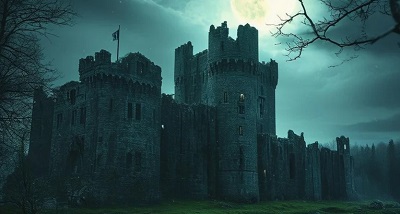
Huntly Castle in Huntly, de geboorteplaats van George MacDonald
De Amerikaanse dichter Carl Sandburg werd geboren op 6 januari 1878 in Galesburg, Illinois. Zie ook alle tags voor Carl Sandburg op dit blog.
Thema in geel
Ik zie de heuvels
Met gele ballen in de herfst.
Ik verlicht de prairie-maïsvelden
Oranje en goudbruine trossen
En ik word pompoenen genoemd.
Op het einde van oktober
Wanneer de schemering valt
Kindjes slaan handen ineen
En cirkelen om me heen
Zingende spookliederen
En liefde voor de oogstmaan;
Ik ben een pompoenlantaarn
Met vreselijke tanden
En de kinderen weten
Ik maak een grapje.
Vertaald door Frans Roumen
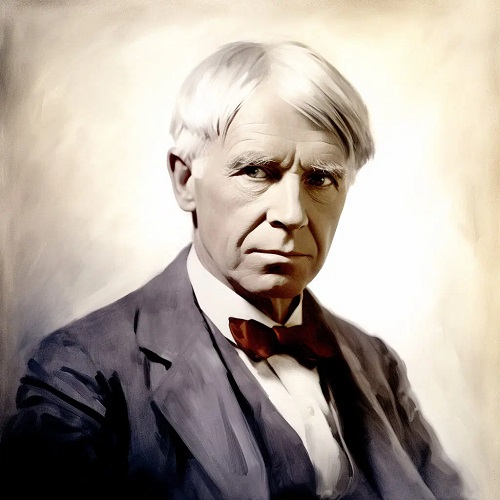
De Canadese schrijver Joseph Boyden werd geboren op 31 oktober 1966 in Willowdale, Ontario. Zie ook mijn blog van 31 oktober 2010 en eveneens alle tags voor Joseph Boyden op dit blog.
Uit: Door het zwarte sparrenwoud (Vertaald door Josephine Rijnaarts)
“Hij had zwaar letsel aan zijn hoofd en het is al een wonder dat hij nog leeft. Maar leeft hij nog wel, zoals hij daar ligt? Ik wil het Eva vragen terwijl ze zijn benen masseert. “Kom, Annie, help me eens,” zegt ze. ‘Doe jij zijn armen maar. Zo hou je de bloedsomloop op gang. Dat is van levensbelang.’ ‘Ik vind het maar eng,’ zeg ik, als ik aan de andere kant van het bed met zijn arm in mijn handen sta. ‘Wat vind je eng?’ ‘Hem aanraken. Ik kan me niet herinneren dat ik hem ooit in mijn leven heb aangeraakt.’ ‘Zet je eroverheen.’ Eva ademt zwaar terwijl ze bezig is. Ze puft en blaast. Ik ken haar al mijn hele leven en ze is altijd dik geweest. Heel dik. Ze heeft een appelgezicht en de afmetingen van een beloega, en ze is mijn beste vriendin. ‘Heb je tegen hem gepraat?’ vraagt ze. Ik haal mijn schouders op. ‘Dat vind ik nog enger,’ antwoord ik. ‘Het is net alsof je tegen een dode praat.’ ‘Ik zou me maar verontschuldigen als ik jou was,’ zegt Eva. le maakt hem van streek met dat soort opmerkingen.’ Als Eva naar de volgende kamer loopt, ga ik bij hem zitten en staar hem aan. Hij lijkt half zo zwaar als toen ik vorig jaar wegging. De dokters hebben zijn lange, zwarte, met grijs doorschoten haar moeten afscheren. Hij ziet er nu ook ouder uit dan de vijfenvijftig jaar die hij telt. Hij heeft flink wat verbleekte littekens op zijn hoofd, witte zigzaglijnen tussen peper-en- zoutkleurig, pluizig haar. In mijn verbeelding zie ik hem wakker worden met een grijns op zijn gezicht, zodat hij er met die twee ontbrekende voortanden uitziet als een jongetje. Mama zegt dat hij al dat gewicht afgelopen zomer en herfst is kwijtgeraakt bij het vallen zetten in de wildernis. Ik wist dat er iets heel erg mis was toen mijn moeder zei dat hij in de zomer was gaan jagen. Waarop dan? Een bruin kleurtje? Alsof ik haar heb geroepen, verschijnt mijn moeder en komt op de stoel naast me zitten. Ze geeft me een piepschuimen doosje. ‘Eet op,’ zegt ze. le bent net zo mager geworden als hij, Annie.’ `Ik heb geen honger,’ zeg ik. `Ze moeten hem in de gaten houden,’ zegt mama, over zijn hoofd aaiend alsof hij een kind is. `Eva is hier net geweest, mam. Je kunt haar vertrouwen. Ze weet wat ze doet.”
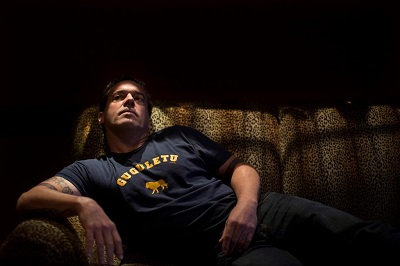
Zie voor nog meer gedichten over Halloween ook alle tags voor Halloween op dit blog.
Zie voor de schrijvers van de 31e oktober ook mijn blog van 31 oktober 2018 deel 1 en eveneens deel 2.

